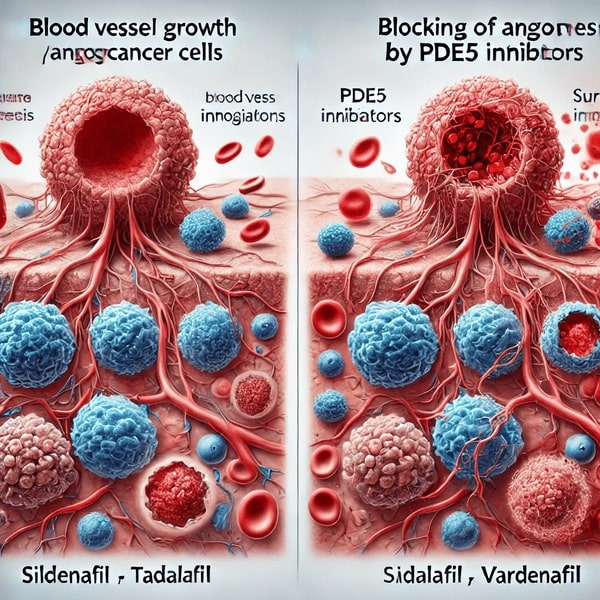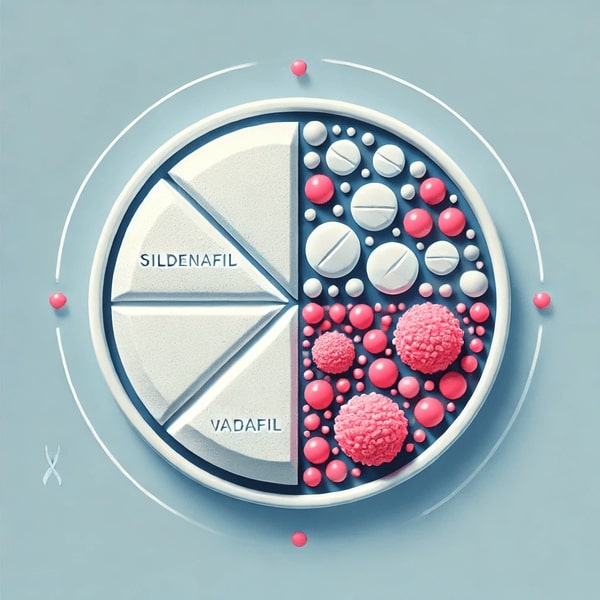You’ve likely heard about Sildenafil, Tadalafil, and Vardenafil as popular treatments for erectile dysfunction (ED). These drugs have improved the quality of life for many men worldwide. But what if I told you that these same drugs might also have a surprising new use: helping to fight cancer?
This emerging area of research is getting a lot of attention. It turns out that the same mechanisms that make these drugs effective for treating ED could also play a role in cancer treatment. Here’s everything you need to know about how these drugs might be more than just ED medications.

The Surprising Role of PDE5 Inhibitors in Cancer Treatment
Sildenafil, Tadalafil, and Vardenafil are PDE5 inhibitors—they work by blocking the enzyme phosphodiesterase type 5, which allows blood vessels to relax and improves blood flow. In the case of ED, this results in better blood flow to certain areas of the body. But recent research shows that these drugs can affect tumor growth and metastasis (the spread of cancer) in some cancers.
How Does It Work?
It might sound strange that drugs used to treat ED could help with cancer, but it actually makes sense when you look at the science behind it:
- Blocking Angiogenesis (Growth of Blood Vessels):
Cancer cells need to form new blood vessels (a process called angiogenesis) to grow and spread. PDE5 inhibitors, however, can block this process. Without new blood vessels, cancer cells struggle to get the oxygen and nutrients they need to grow. - Improving Immune Response:
PDE5 inhibitors can help the immune system recognize and fight cancer cells more effectively. Tumor cells often hide from the immune system by creating an environment that suppresses immune function. Sildenafil, Tadalafil, and Vardenafil may disrupt this protective environment, making it easier for the immune system to attack cancer cells.
What Does the Research Say?
There have been several promising studies that suggest PDE5 inhibitors could be used as complementary treatments in cancer therapy:
- Prostate Cancer:
Research suggests that Sildenafil and similar drugs may help slow the growth of prostate cancer. In animal studies, these drugs reduced tumor size and prevented metastasis by inhibiting angiogenesis. - Lung Cancer and Others:
Although early-stage, there is evidence that these drugs may help prevent the spread of lung cancer, breast cancer, and even brain tumors. Scientists are particularly excited about the potential to combine these drugs with existing cancer therapies to boost effectiveness. - Reducing Chemotherapy Side Effects:
Another interesting finding is that PDE5 inhibitors may reduce the side effects of chemotherapy by protecting healthy tissues from damage. This means cancer patients might tolerate traditional treatments better when these ED drugs are added to their treatment plans.
Can ED Drugs Really Be Used to Treat Cancer?
You might be wondering: if these drugs are so effective, why aren’t they being used for cancer treatment right now?
The truth is, this research is still in its early stages. While studies have shown positive results in the lab and in animals, we need more clinical trials in humans to know for sure how well these drugs work against cancer in real patients.
However, doctors are already looking at ways to include PDE5 inhibitors in complementary cancer treatments. For example, they might be used alongside traditional therapies like chemotherapy or radiation to improve outcomes and make the treatments more effective. In some cases, this could mean slower tumor growth and better overall survival rates.
Are There Risks?
Like any medication, Sildenafil, Tadalafil, and Vardenafil come with potential side effects. When it comes to cancer treatment, the biggest question is how these drugs might interact with other cancer therapies. Researchers are still exploring whether there are any risks or negative interactions, but so far, the results look promising.
Doctors stress the importance of working closely with healthcare providers to carefully monitor any potential risks. Never try to self-medicate for cancer based on what you read online. Always consult your doctor for professional advice.
Combining PDE5 Inhibitors with Cancer Therapies
Some of the most exciting research involves combining PDE5 inhibitors with other treatments:
- Chemotherapy:
Adding PDE5 inhibitors to chemotherapy may help reduce the chance of cancer cells developing resistance to the drugs. This could make chemotherapy more effective and help prevent cancer from spreading. - Radiotherapy:
PDE5 inhibitors might also improve the effects of radiation therapy by increasing oxygen flow to tumor cells, making them more sensitive to radiation.
This combination approach could potentially extend the lives of cancer patients and reduce the unpleasant side effects of traditional therapies.
The Future of PDE5 Inhibitors in Cancer Care
So, what’s next for these medications? The research is ongoing, and we will likely see more clinical trials in the near future. If proven effective, PDE5 inhibitors could become a standard part of cancer care, especially for cancers like prostate, lung, and breast cancers.
While we’re not quite there yet, the potential is huge. This research offers new hope for cancer patients, and as scientists continue to study these drugs, we may soon see breakthroughs in how we treat various types of cancer.
Conclusion: More Than Just ED Drugs
While Sildenafil, Tadalafil, and Vardenafil are widely known for treating erectile dysfunction, their potential role in cancer treatment is gaining momentum. They could help slow tumor growth, enhance the immune response, and improve the effectiveness of traditional cancer therapies.
As more research is conducted, the future may reveal a new dual-purpose for these medications—helping not only with ED but also in the fight against one of the deadliest diseases on the planet.
For now, if you or someone you love is dealing with cancer, it’s worth having a conversation with a healthcare provider about new and emerging treatment options. And who knows? The same pill that helps men with ED may one day be a key tool in the fight against cancer.
Sources:
- Paul E. Marik, MD, FCCM, FCCP – The role of repurposed drugs and metabolic interventions in treating cancer –
https://covid19criticalcare.com/reviews-and-monographs/cancer-care/

 Douglas Goldberg
Douglas Goldberg